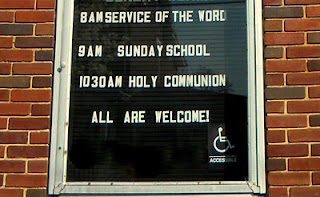pieces of love (fall into place)

(This photo has been cropped and digitally edited to avoid giving the impression I am endorsing a particular church.)
To go back to ecology and the Trinity, I read theologian, Amos Yong's synthesis of Moltmann's notion of Trinity:"If in trinitarian theology the Father (sic), Son, and Spirit are divine precisely insofar as they have their identity in subsistence (interpenetrating) relations with the other two persons, so also in a trinitarian theology of creation particular things are valued for what they are precisely because they are constituted by their unity in dynamic relationship with others (other things, creatures, human beings, and God.)"
I liked this summary, and I think Yong articulates the implications well:
"This framework prevents and overly anthropocentric understanding of the created world, even as it enables proper emphasis on humankind with a more cosmocentric perspective. "
Yong's particular interest is not ecology, though.
Yong, emphasizing the work of the Spirit, draws implications of the trinitarian theology and anthropology.
"Self-consciousness is neither a necessary nor a sufficient criterion for the image of God; rather, in an emergentist-theological account, it is relationship with God that counts, especially that which we now anticipate as promised in the eschaton. Human nature is in the making, preformed by God in and through us as we are enabled by the power of the Holy Spirit."
Yong is articulating a meaningful theology for persons with disabilities, specifically down syndrome. His treatment of the Trinity is working to counter subtle ableism in popular theology. Here Yong is showing us how a robust theology of the Trinity is not obsessed with conscience or ability. Instead the Trinity is about relationships. If relationships define God, how much of human identity should be focused on one's ability for self-consciousness?

Comments
Post a Comment